Coronavirus: Six challenging months for undertakers
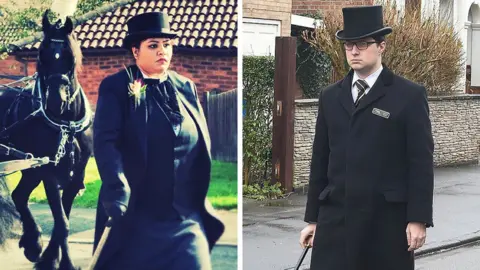 Drakeley's Funeral Directors and A.M. Lymn
Drakeley's Funeral Directors and A.M. Lymn"We've had to deal with a very real problem that was right in front of our faces."
It's been six months since the UK started putting restrictions in place to limit the spread of coronavirus.
For undertakers like Colum O'Shea, it's been a challenging time as the pandemic has caused extra pressure.
"We've had no choice, because we can't just close and have a think for a few months," the 28-year-old tells Radio 1 Newsbeat.
Co-op revealed a 22% rise in its funerals for the first six months of the year, compared with the same period last year.
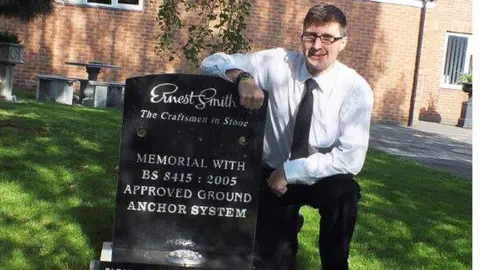 A.M. Lymn
A.M. LymnLike the rest of us, funeral directors have also had to limit human contact.
"Normally we would sit around a desk in my office or go and see the family at home - that's all had to stop."
"In some ways, it's become more desensitised," Colum, who is a funeral director at A.W. Lymn in Nottinghamshire, adds.
"The biggest challenge has been trying to reassure and support families."
Restrictions have made that harder because Colum has "lost the ability" to look families in the eyes.
"A lot of what we try to achieve is empathy."
"Normally, on the day of a funeral, we're very reassuring. Shaking people by the hand, giving them a touch on the elbow or the shoulder."
'A profession that now says no'
Colum says the funeral industry prides itself on providing families with whatever they need.
But the last six months have meant "we've become the profession that says no".
"We haven't provided private room viewings or limousines that would follow the hearse."
It's been "awful" for Colum having to tell family members they aren't allowed to invite as many people as they would like.
The Smallman family know exactly how that feels.
They wanted a huge funeral to celebrate the life of Holly, 18, who was born with a series of serious medical problems that left her unable to see or speak.
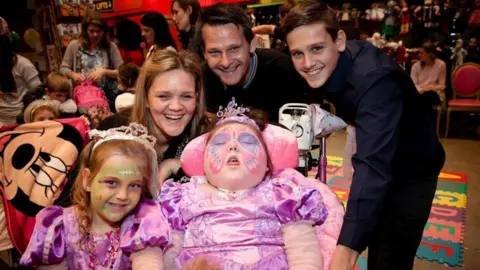 Hayley Smallman
Hayley SmallmanHer funeral is one of thousands that were still allowed to go ahead, but only with immediate or close family attending, and following social distancing rules.
Colum adds: "I know from personal experience, friends of mine that have sadly passed away during this time, how difficult it is knowing that I can't attend the funeral service."
For Meera Bhanot, it's been an "emotionally charged and hectic" period.
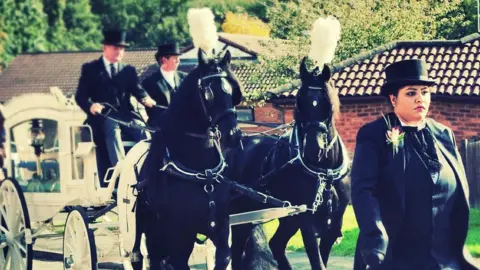 Drakeley's Funeral Directors
Drakeley's Funeral DirectorsShe is a funeral director assisting families from an Indo-Asian background and with BAME groups at greater risk of death from Covid-19, Meera, 35, has been busier than ever.
"Traditionally there's services held at home where there'd be an open coffin viewing at home, with rituals such as washing the deceased, dressing them and preparing them for their funeral."
"But that's not possible. So we're on the front line, having to tell people 'no', and effectively police this."
The difficulties hit home on a personal level for Meera - she lost both of her grandparents during the pandemic.
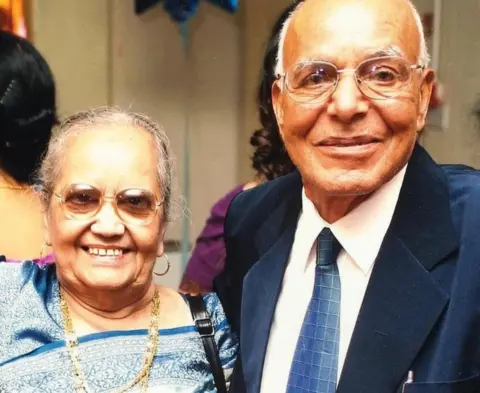 Meera Bhadot
Meera BhadotHaving to plan the arrangements for their funeral took "an emotional toll", especially as it "was a shadow of what it should have been".
"I was having to deal with family members saying I should be able to change things for us so we could follow our rituals and traditions."
"But you can't, because the rules are for everyone and you need to stick to them."
Rules in England now say family and friends up to 30 people can attend funerals, as long as social distancing is observed and face coverings are worn.
Both Meera and Colum say they are proud of how the funeral industry has responded to the crisis.
"My colleagues around the country have done a wonderful job guiding people who are uncertain," Meera says.
"It has been stressful. There's been a lot of late nights and early mornings," Colum adds.
So what about the next six months?
Both Colum and Meera feel the streaming of funerals could become more common.
Meera thinks given the current situation it's a good thing calling it "a godsend" for family members who couldn't attend her grandparents funeral.
"It's actually one of the few positives from the last six months, as it allows people to be in touch regardless of how far away you are," she adds.

